The Guardian looks into the secrecy surrounding the monarchy's "private" finances
The Guardian looks into the secrecy surrounding the monarchy's "private" finances
A British outlet, usually the Guardian, will occasionally attempt to report on the British monarchy's secretive finances. The details of the Sovereign Grant are published every year. However, the SG is not the only source of income for the Windsors. The Duchy of Cornwall is available to the monarch, while the Prince of Wales has access to its vast resources. Both duchies have billion-dollar real estate and investment portfolios. My personal belief is that Charles spent considerable time William-proofing Cornwall so that William wouldn't take the whole duchy and spend it like a drunken seaman. The Guardian has a new...
A British outlet, usually the Guardian, will occasionally attempt to report on the British monarchy's secretive finances. The details of the Sovereign Grant are published every year. However, the SG is not the only source of income for the Windsors. The Duchy of Cornwall is available to the monarch, while the Prince of Wales has access to its vast resources. Both duchies have billion-dollar real estate and investment portfolios. My personal belief is that Charles spent considerable time William-proofing Cornwall so that William wouldn't take the whole duchy and spend it like a drunken seaman. The Guardian has a new series on the secret money situation of the royal family. You can find one of the pieces here. Here are some highlights: The money from the duchies: King Charles II and Queen Elizabeth II received payments of more than PS1bn each from two land- and property estates. This is the center of a centuries-old debate about whether the profits be given to the general public or to them. The duchies in Lancaster and Cornwall. The duchies are professional-run real estate empires that manage large swathes land, hotels, medieval castles and offices. They also own some of London's most luxurious real estate. They have large investment portfolios and pay no capital gains or corporation tax. The duchy accounts are held in state and parliamentary archives. They show how the queen and her son, the Duke of Cornwall, have benefited greatly from the huge rise in revenues from the duchies over her seven-decade reign. Their duchy income was PS41.8m last year. After adjusting for inflation, they have earned more than PS1.2bn from the estates. Profits: The Duchy of Lancaster's 18,481 hectares of land in rural areas, located primarily in the north of England, and the Midlands, automatically passes to the person sitting on the throne. The estate is worth PS652m. The Duchy of Cornwall covers 52,450 hectares. It is located mainly in the south-west of England. It is worth more that PS1bn. It has not kept up with the 2013 legislation that brought gender equality to royal succession. Its proceeds go only automatically to the male heirs to the throne. The claim of the Windsors to the duchies is based on archaic charters that date back to medieval times when the country was divided. Generations of MPs have questioned the arrangement since the birth of parliamentary democracy and demanded that duchy profits be paid to Treasury instead. Parliamentary debate often occurs with the accession to a new monarch. This has brought renewed scrutiny over their private and public wealth sources. The Windsors won't spend their own money. The royals claim their duchy income, which they call "private", is not available to the government. The sovereign grant is the annual payment that the royal family receives from government to pay its official expenses. This too has increased dramatically in recent years and costs taxpayers PS86m per year. Buckingham Palace declined comment to the Guardian's estimates for income from the duchies. It described them as "speculative". The Windsors claim that they spend their duchy money. The palace has stated for years that the majority of income from both duchies goes to the family's official duties and public works. The royals have not provided any detailed information about how the money is spent from their estates, calling them "private financial arrangements". Charles reported that between 49% and 51% of his duchy income was used to fund charitable and public functions in recent years. What the duchy money was actually spent on: Charles, Prince of Wales, spent a significant amount of his duchy income privately on secretaries and valets as well as gardeners, chefs, stable workers, and chefs. According to some reports,...
-
 3:33
3:33
Wawawiiwa Entertainment
1 year agoThe titles of Prince Archie and Princess Lilibet are now in the order of succession
54 -
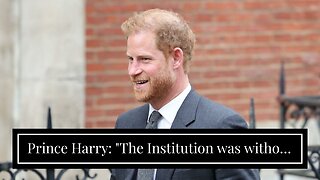 4:16
4:16
Wawawiiwa Entertainment
1 year agoPrince Harry: "The Institution was without any doubt withholding information about me."
1811 -
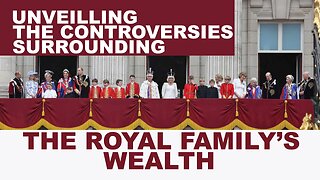 2:13
2:13
FinancialFitnessTV
1 year agoUnveiling the Controversies Surrounding the Royal Family's Wealth
54 -
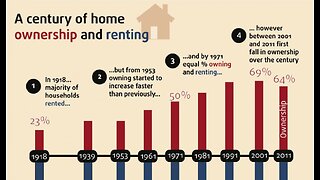 56:24
56:24
TonyGosling
4 months agoIs Britain Still a Feudal Country? Security of Tenure Discussion with Kevin Cahill & Simon Fairlie
166 -
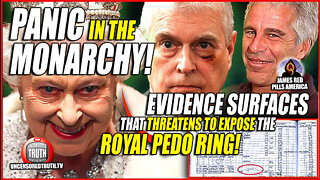 19:41
19:41
James Red Pills America Official
1 year agoGLOBAL ELITES PANIC! Evidence Surfaces After Queen’s Death That Threatens To EXPOSE Their Pedo Ring!
1.54K -
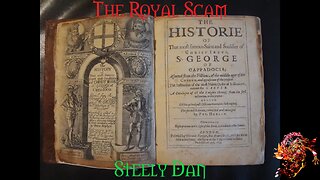 6:35
6:35
Psychological operations
1 year agoThe Royal Scam
3461 -
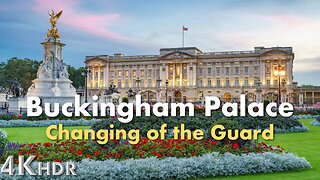 14:18
14:18
Welcome Abroad
1 year agoBuckingham Palace Changing of the Guard 4K | LONDON 2023
771 -
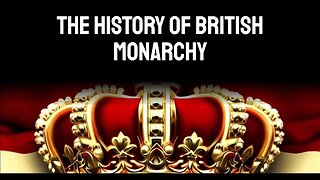 4:00
4:00
Samprudent
1 year agoThe History of British Monarchy
93 -
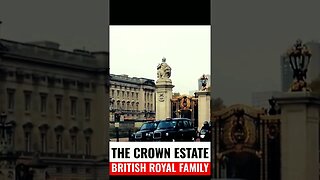 0:15
0:15
FinancialFitnessTV
1 year agoBritish Royal Family | Crown Estate Assets
9 -
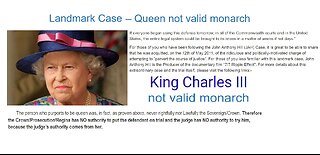 51:05
51:05
We The People - Constitutional Conventions
3 months agoLandmark Case – Queen not valid monarch and same as King Charles III
2.16K4